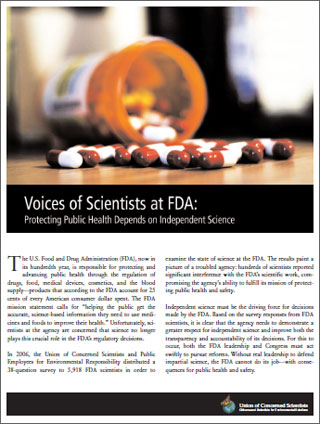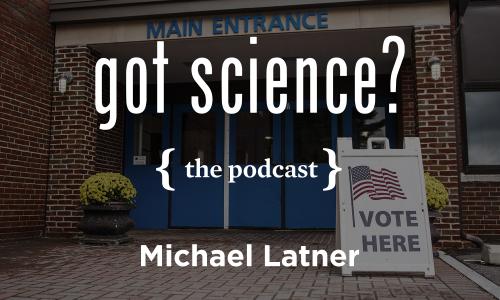The U.S. Food and Drug Administration (FDA) is responsible for protecting and advancing public health through the regulation of drugs, food, medical devices, cosmetics, and the blood supply—including products that, according to the FDA, account for 25 cents of every American consumer dollar spent.
In 2006, the Union of Concerned Scientists (UCS) and Public Employees for Environmental Responsibility (PEER) distributed a 38-question survey to 5,918 FDA scientists to examine the state of science at the FDA. The results paint a picture of a troubled agency: hundreds of scientists reported significant interference with the FDA's scientific work, compromising the agency's ability to fulfill its mission of protecting public health and safety.
The National Academies weigh in
In September 2006, the National Academies Institute of Medicine released a report critical of the FDA and its ability to protect the public from unsafe drugs. In a section discussing the poor handling of scientific disagreement, the report mentioned the UCS survey result indicating that hundreds of agency scientists had been pressured to approve a drug despite reservations about safety.
The report describes the acknowledgment of these concerns by acting FDA commissioner Andrew von Eschenbach when questioned about the UCS survey at his Senate confirmation hearing and in a separate meeting with UCS about scientific integrity at the FDA.
Returning to its scientific mission
The FDA mission statement calls for "helping the public get the accurate, science-based information they need to use medicines and foods to improve their health." Unfortunately, scientists at the agency are concerned that science no longer plays this crucial role in the FDA’s regulatory decisions.
Independent science must be the driving force for decisions made by the FDA. Based on the survey responses from FDA scientists, it is clear that the agency needs to demonstrate a greater respect for independent science and improve both the transparency and accountability of its decisions.
For this to occur, both the FDA leadership and Congress must act swiftly to pursue reforms. Without real leadership to defend impartial science, the FDA cannot do its job—and public health and safety will suffer.




